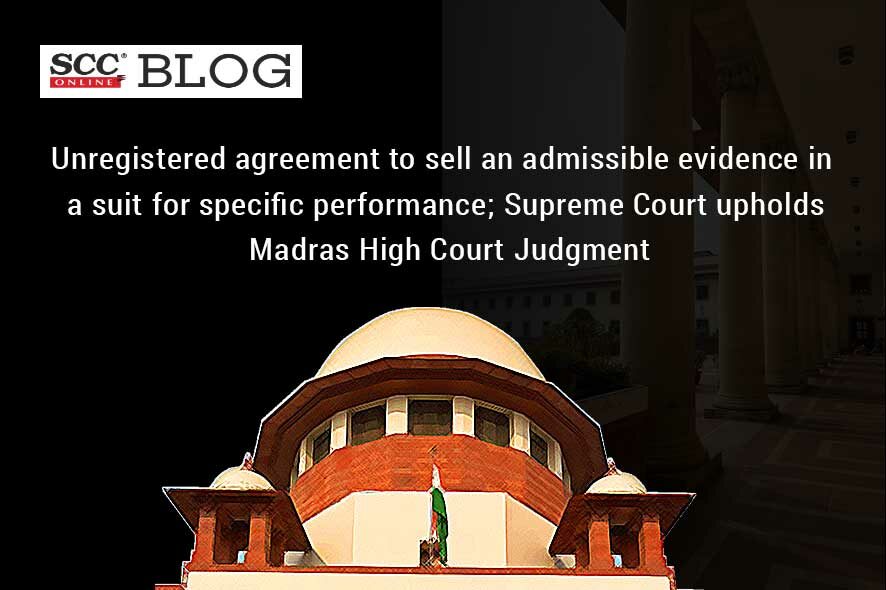Supreme Court: In an appeal against the judgment and order passed by the Madras High Court, wherein the Court has allowed the revision application preferred by the respondent by quashing and setting aside the order passed by the Trial Court that the unregistered Agreement shall not be admissible in evidence, the division bench of MR Shah* and Krishna Murari, JJ. has upheld the impugned judgment and order of High Court that the unregistered agreement to sell shall be admissible in evidence in a suit for specific performance and the proviso is exception to the first part of Section 49 of the Registration Act, 1908 (‘Act 1908’).
In the case at hand, the respondent/plaintiff instituted a civil suit for specific performance of the agreement to sell. On the application filed by the appellant, a preliminary issue was framed by the Trial Court on the admissibility of the Agreement in evidence. It was the case on behalf of the appellant/defendant that in view of the Registration (Tamil Nadu Amendment) Act, 2012 (‘Amendment Act, 2012’) to the Act, 1908 under which the instruments of agreement relating to sale of immovable property of the value of Rs.100 and upwards are compulsorily required to be registered, the said unregistered document shall be inadmissible in evidence.
Further, relying upon Section 49(a) and (c) of the Act, 1908 the respondent submitted that an unregistered agreement to sell can be admitted as evidence of a contract in a suit for specific performance.
The question posed for consideration was the effect of the Amendment Act, 2012 by which Section 17(1)(g) has been inserted and instruments of agreement relating to sale of immovable property of the value of Rs.100 and upwards is made compulsorily registrable, and whether such unregistered agreement relating to sale of immovable property can be received in evidence in a suit for specific performance?
The Court took note of Section 17 of the Registration Act, 1908, prior the Amendment Act, 2012 (‘Act, 2012’) and Section 17 post Amendment Act, 2012, and said that on and after the Act, 2012, as per Section 17(1) (g), instrument of agreement relating to sale of immovable property of the value of Rs. 100/- and upwards is required to be registered compulsorily. However, despite the same and despite the “explanation” to Section 17(2) has been omitted, there is no corresponding amendment made to Section 49 of Act, 1908.
Further, the Court said that as per proviso to Section 49, an unregistered document affecting the immovable property and required by Registration Act to be registered may be received as evidence of a contract in a suit for specific performance under Chapter-II of the Specific Relief Act, 1877, or as evidence of any collateral transaction not required to be effected by registered document.
The Court also took note of the primary statement of objects and reasons of the Amendment Act, 2012, and said that it seems to suggest that amendment has been introduced by the State bearing in mind the loss to the exchequer, as public were executing the documents relating to sale of immovable property etc. on white paper or on stamp paper of nominal value.
The Court noted that by the proviso to Section 49 and Section 17(1A) the documents containing contracts to transfer or consideration any immovable property for the purpose of Section 53 of the Transfer of Properties Act is made compulsorily to be registered if they have been executed on or after 2001 and if such documents are not registered on or after such commencement, then there shall have no effect for the purposes of said Section 53A. So, the exception to the proviso to Section 49 is provided under Section 17(1A) of the Registration Act. Otherwise, the proviso to Section 49 with respect to the documents other than referred to in Section 17(1A) shall be applicable.
Further, the Bench said that as per proviso to Section 49 of the Registration Act, an unregistered document affecting immovable property and required by Registration Act or the Transfer of Property Act, 1882 to be registered, may be received as evidence of a contract in a suit for specific performance under Chapter-II of the Specific Relief Act, 1877, or as evidence of any collateral transaction not required to be effected by registered instrument, subject to Section 17(1A) of the Registration Act.
Thus, the Court upheld the High Court’s impugned judgment and order.
[R. Hemalatha v. Kashthuri, 2023 SCC OnLine SC 381, decided on 10-04-2023]
*Judgment by: Justice MR Shah






